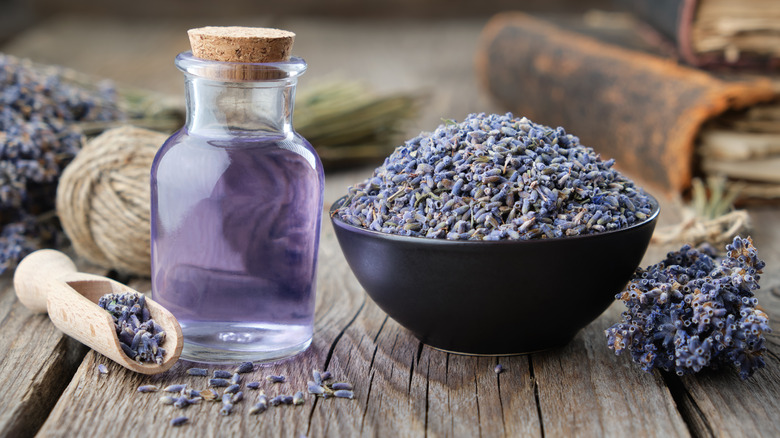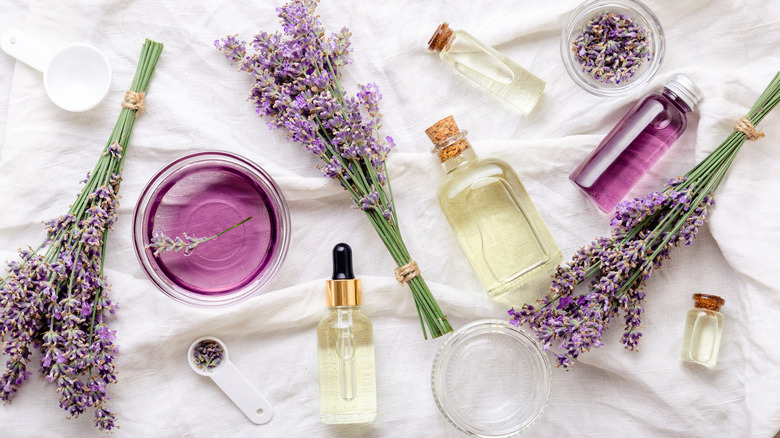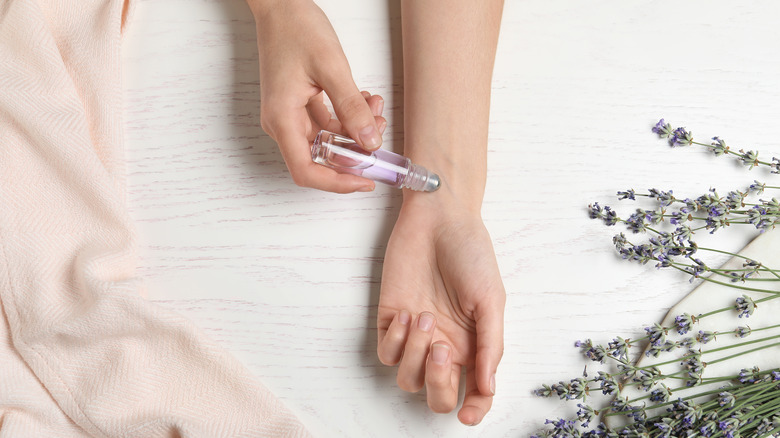What You Need To Know Before Using Lavender Oil For Skincare
Have you ever considered using lavender oil for skincare? You've probably heard that lavender may relieve stress and anxiety due to its soothing scent. Some say that it can also lift your mood and improve sleep. Clinical evidence also supports these claims, per a 2013 report on lavender and the nervous system, published in Evidence-Based Complementary and Alternative Medicine. What you may not know is that lavender oil may benefit your skin as well.
Rich in antibacterial and anti-inflammatory compounds, this essential oil may reduce acne and blemishes. It also soothes irritated skin and promotes healing. For example, a 2012 study published in the American Journal of Dentistry suggests that lavender oil may decrease inflammation and speed up tissue repair. Moreover, it inhibits bacteria and relieves pain. These effects occurred within three days of treatment.
Lavender oil may also help with wound healing, according to a 2016 study featured in BMC Complementary and Alternative Medicine. Researchers believe that it boosts collagen synthesis, helping the body repair damaged tissues. In other studies, this multipurpose oil reduced pain and redness after episiotomy (via BMC Complementary and Alternative Medicine). But despite these findings, you should use lavender oil with caution. Here's what you should know about its potential benefits and risks.
Lavender oil may reduce acne, eczema, and fine lines
Acne treatments, anti-aging creams, and ointments often contain harsh chemicals that can affect your skin in the long run. Topical acne products, for example, may cause irritation and allergic reactions, warns the FDA. Shortness of breath, burning, redness, and hives are all potential side effects.
Considering these risks, it's not surprising that consumers worldwide are switching to natural skincare products. Lavender oil could be an alternative to anti-aging serums, skin-lightening creams, and conventional acne treatments, according to Healthline. First of all, it kills blemish-causing bacteria, which in turn may help prevent and reduce acne breakouts. Second, it suppresses inflammation.
The same source reports that lavender oil may help with eczema, psoriasis, dark spots, and other skin problems. Due to its antioxidant activity, it protects your skin from free radical damage and may slow the formation of wrinkles and fine lines. It also acts as an antimicrobial agent and may inhibit Staphylococcus aureus (via the Archives of Pharmacal Research). This bacterium may be responsible for eczema and other skin diseases, per the National Eczema Association.
Think twice before using lavender oil for skincare
A widely cited study published in the journal Cell Proliferation suggests that linalyl acetate, an active compound of lavender oil, is toxic to human skin cells. Scientists warn that using lavender oil for skincare may result in allergic reactions. Doctor Purvi Parikh told Refinery29 that linalyl acetate, geraniol, and linalool — the primary compounds of lavender oil — may cause rashes. This side effect is more likely to occur in those who are allergic to other contact allergens, such as latex, nickel, or salicylate.
Clinical research published in the Mental Health Clinician states that lavender oil is less likely to cause skin irritation and inflammation than other essential oils. You can even put it directly on your skin without first diluting with a carrier. Aromatherapy expert Robert Tisserand says that using lavender oil for skincare is completely safe. While it's true that linalool and other compounds of the oil may cause toxicity, these effects were only observed in vitro, or outside of a living organism. "Any type of in vitro test is only suggestive of a possible effect. You can never assume that the same effect will take place in the living body," says Tisserand.
If you're concerned about the risks of lavender oil, apply a few drops on your inner arm or behind your ear. Wait 24 hours to see how your body reacts (via Glamour). If there are no signs of irritation, go ahead and apply the oil to your face or neck.


